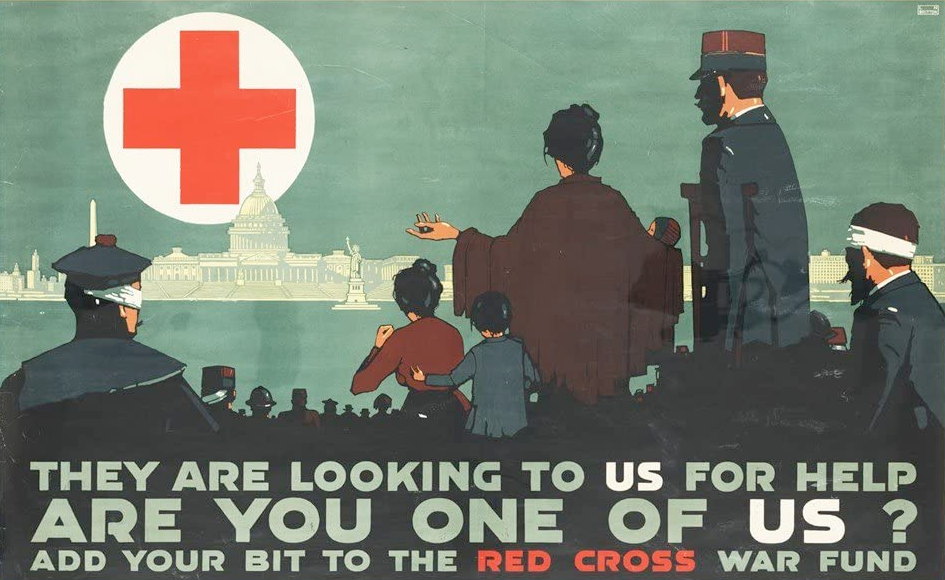
Poster by L. N. Britton for the American Red Cross War Fund, 1917.
Some years ago, Mark Morocco, an actor, was in a terrible car accident with his wife, Lisa. Because they were both young, otherwise healthy, and lucky—and because they were quickly attended to by skilled emergency physicians and trauma surgeons—they survived.
A year later, Mark left acting behind to return to school to become an ER doctor. When asked why, he explained that the physicians who saved his life were engaged and passionate—the way artists are engaged and passionate.
A characterization that testifies to one man’s generosity of character, if nothing else.
Artistic responses to disaster have a rich history all their own, from public art projects to public health campaigns to radical expressions of protest, resistance, and dissent. How, and where, and when—and with what frequency and insistence—we respond to adversity says as much about artists as individuals as about the communities within which we work.
Communities themselves crystalize in crisis, unified at the nexus of solidarity (which is communal) and suffering (which is not). Coming to terms with a catastrophe is disorienting, which explains the occasional urge to channel your inner location scout: recalling where you were, say, when JFK was shot, when the Challenger exploded, or when the Twin Towers collapsed. But must you relate to a disaster to give it meaning?
A question for another day.
For now, it bears saying that we each respond to crisis in different ways. Some of us retreat. Others mope. Still others live vicariously through influencers (a questionable term if there ever was one) who persist, for whatever reason, as the deities of choice for a certain swath of the population. When 22-year old Kylie Jenner posted a photo earlier this week, on Instagram, reporting that she was bored, she received more than one hundred thousand comments, and nearly six million likes.
Six. Million. Likes.
For context, that’s about two percent of the entire US population. It’s the entire population of Denmark. It’s the approximate number of Jews who died during the Holocaust.
Don’t be fooled. Social media, disguised as communication, and which traffics in the counterintuitive circuitry of the tautological, is not now—nor has it ever been—an art form. Tempting to think otherwise, but think of this as a wake-up call.
Witnessing a crisis does not require you to be endlessly productive but it does offer you the opportunity to shift gears. You can’t be passive and passionate at the same time. To be truly self-reliant is to reclaim your own voice, your own mind, your own practice. For now? Stop applauding apathy. Start reclaiming agency. Look hard. Listen harder. Accept that life is unpredictable, that pain is subjective, and that boredom, for God’s sake, is not the same as suffering.
Today, Dr. Mark Morocco serves on the front lines as an emergency physician at UCLA. He's a first responder, and has been for nearly three decades. I know of no one more devoted to his patients, his colleagues, and his community—no one, for that matter, more passionate or more engaged, and why?
The force of character, Emerson once wrote, is cumulative.
The way we respond to the world, through our work, says everything about who we are, individually and as a people. Responses are reactions, and reactions demand attention. Attention is how we express kindness, commitment, love—and most critically right now, altruism.
For the weekend ahead, consider how you can be there for someone else. Generosity of character is everything. The struggle, as it turns out, is actually real.
The Self-Reliance Project is a daily essay about what it means to be a maker during a pandemic. Sign up to get it delivered to your inbox here.
